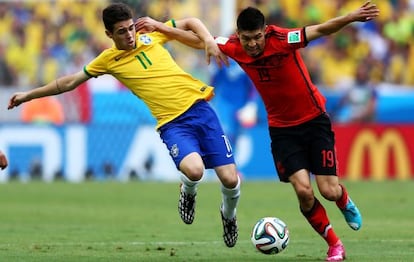A generation unafraid of losing
Mexico is relying on striker Oribe Peralta to beat Luka Modric’s Croatia and progress at Brazil 2014


Oribe Peralta had been showing that lingering melancholy common among strikers who do not score goals. Just a few weeks before the London Olympic Games, rival goalkeepers saw him more as an ally than an enemy. His teammates began to despair at practice games. “Dude, just score one!” they urged him. The coach invited the team to play golf to get it into a more relaxed frame of mind. Mexico’s number 9 was just as unreliable with a club. He was incapable of putting the ball into the hole.
The pessimism that surrounded that under-23 Olympic team finally subsided when Peralta began to score again. The team went on to beat Brazil 2-1 in the final at Wembley with Peralta scoring both goals. He buried forever the tragic notion that Mexicans play soccer to suffer and to lose. On Monday night, El Tri will bet on Peralta as he leads the attack in the match against Croatia for a place in the second round of the World Cup. Coach Miguel “El Piojo” Herrera has said he will start the match with the same 11 who played in the first two games of the tournament and gave the team a 1-0 victory against Cameroon – Peralta scored the winning goal – and a 0-0 tie with host Brazil. The decision means Javier “Chicharito” Hernández – the team’s golden boy not too long ago – will sit on the bench.
Peralta will play instead of Chicharito, who was El Tri’s golden boy until recently
The Mexican striker known as cepillo (brush) because of his haircut is also a married father of two. He was born in Torreón in 1984 and grew up on common land in La Partida in northern Mexico. The town is a group of public land holdings the government gave to rural workers after the revolution. By the age of 12, Peralta was already playing on the senior team in La Partida. The group was called Los Vagos (The Slackers) because the youth of the region were well known for their idleness. Most of the teenagers around him drank and smoked but those who knew Peralta say he was “very stubborn” and wanted to follow his own path. Peralta has just joined Club America after four years at Santos Laguna. He will not play in the English Premier League like Chicharito and he will not star in advertising campaigns for big clothing brands. Yet, it would be hard to find one Mexican who does not want to see Peralta start Monday's match.
Croatia is expecting a strong opponent but Mexico only needs a tie to qualify. Still, Croatia’s good performance against Brazil (3-1) and the beating it gave Cameroon (4-0) promises a match between equals. Niko Kovac’s team dances to the tune of central midfielders Luka Modric and Ivan Rakitic with Bayern striker Mario Mandzukic finishing off the moves. Kovac is emphasizing Mexico’s aggressive style but he also sees weaknesses in the North American team: “No matter how strong they are on the attack, they are also vulnerable in defense.”
Peralta broke his leg when he was 17 years old, just before a scheduled tryout for Real Madrid
Off the field, Mexico fans have caused a little dispute between Fifa and the Mexican soccer federation after they called a rival team’s goalkeeper a puto, a homophobic slur. Héctor González Iñárritu, the director of the Mexican federation, tried to play down the issue, saying it was just something they did. Piojo Herrera said it was not “a big deal” and was only meant to unnerve the rival goalie. Herrera has not exactly shown himself to be sensitive to and respectful of other people’s sexual orientation. After failing to qualify for the 1994 World Cup in the United States, he used the same offensive term to refer to his coach, Mejía Barón. Last year, Herrera said Barón had problems because of his “sexual perversions.” Sports channel ESPN has said it will bleep out the insults from Mexican fans.
When the time comes to suffer, this new generation of Mexican players does not shrink back. They have left behind them the era of the “Green Rats,” the nickname sports journalist Manuel Seyde invented in the 1970s to humorously soften the repeated blows his team suffered. But now things have changed. According to the documentary Oro: el día que todo cambió, the mother of defender Diego Reyes told him to come back from the London Olympics with the gold medal or she would not let him back into the house. Reyes accomplished his mission.
Peralta is obsessed with scoring goals and he is convinced his team is on the verge of “making history.” The 17-year-old kid who broke his leg just when he was about to try out for Real Madrid is ready to attack.
Translation: Dyane Jean François
Tu suscripción se está usando en otro dispositivo
¿Quieres añadir otro usuario a tu suscripción?
Si continúas leyendo en este dispositivo, no se podrá leer en el otro.
FlechaTu suscripción se está usando en otro dispositivo y solo puedes acceder a EL PAÍS desde un dispositivo a la vez.
Si quieres compartir tu cuenta, cambia tu suscripción a la modalidad Premium, así podrás añadir otro usuario. Cada uno accederá con su propia cuenta de email, lo que os permitirá personalizar vuestra experiencia en EL PAÍS.
¿Tienes una suscripción de empresa? Accede aquí para contratar más cuentas.
En el caso de no saber quién está usando tu cuenta, te recomendamos cambiar tu contraseña aquí.
Si decides continuar compartiendo tu cuenta, este mensaje se mostrará en tu dispositivo y en el de la otra persona que está usando tu cuenta de forma indefinida, afectando a tu experiencia de lectura. Puedes consultar aquí los términos y condiciones de la suscripción digital.








































